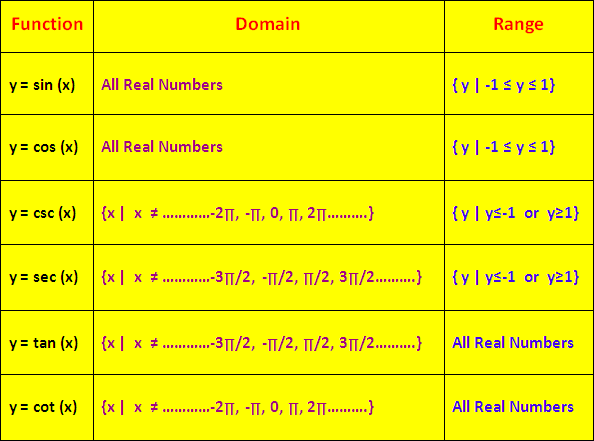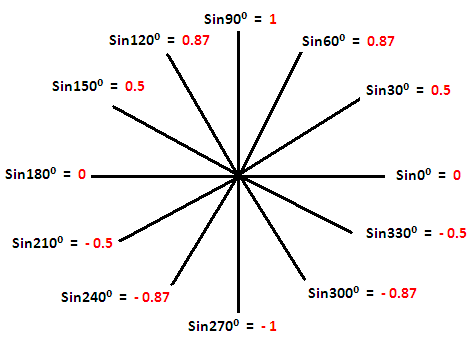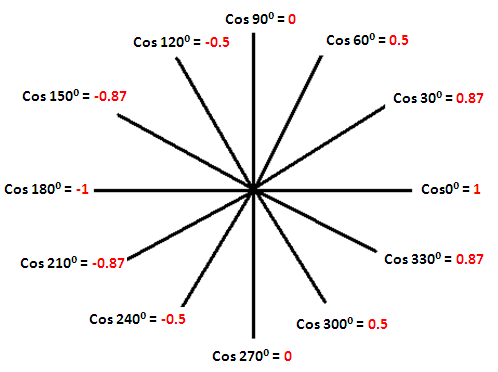DOMAIN AND RANGE OF TRIGONOMETRIC FUNCTIONS
Subscribe to our ▶️ YouTube channel 🔴 for the latest videos, updates, and tips.
To make the students to understand domain and range of a trigonometric function, we have given a table which clearly says the domain and range of trigonometric functions.

Domain of sin x and cos x
In any right angle triangle, we can define the following six trigonometric ratios.
sin x, cos x, csc x, sec x, tan x, cot x
In the above six trigonometric ratios, the first two trigonometric ratios sin x and cos x are defined for all real values of x.
The two trigonometric ratios sin x and cos x are defined for all real values of x.
So, the domain for sin x and cos x is all real numbers.
Range of sin x and cos x
The diagrams given below clearly explains the range of sin x and cos x.
Range of sin x

Range of cos x

From the pictures above, it is very clear that the range of y = sin x and y = cos x is
{y | -1 ≤ y ≤ 1}
Domain of csc x and sec x
We know that sin (kπ) = 0, cos [(2k+1)π] /2 = 0, here "k" is an integer.
Then,
k = ...........-2, -1, 0, 1, 2, ..........
For k = -2,
sin (-2π) = 0 and cos (-3π/2) = 0
For k = -1
sin (-π) = 0 and cos (-π/2) = 0
For k = 0,
sin (0) = 0 and cos (π/2) = 0
For k = 1,
sin (π) = 0 and cos (3π/2) = 0
For k = 2,
sin (2π) = 0 and cos (5π/2) = 0
Stuff 1 :
We know that csc x and sec x are the reciprocals of sin x and cos x respectively.
Let us see the values of csc x for
x = .......-2π, -π, 0, π, 2π, .........
csc(-2π) = 1/sin(-2π) = 1/0 = Undefined
csc(-π) = 1/sin(-π) = 1/0 = Undefined
csc(0) = 1/sin(0) = 1/0 = Undefined
csc(π) = 1/sin(π) = 1/0 = Undefined
csc(2π) = 1/sin(2π) = 1/0 = Undefined
From the above examples, it is very clear, that csc x is defined for all real values of x except
x = .......-2π, -π, 0, π, 2π, .........
So the domain of csc x is
{x | x ≠ ...-2π, -π, 0, π, 2π, ..}
In the same way, domain of sec x is
{x | x≠ ...-3π/2, -π/2, π/2, 3π/2, 5π/2 ...}
Range of csc x and sec x
Let y = csc x.
In the trigonometric function y = csc x, when plug values for x such that
x ∈ R - {.......-2π, -π, 0, π, 2π,.......},
we will get values for "y" which are out of the interval
(-1, 1)
So the range of csc x is
{y | y ≤ -1 or y ≥ 1}
In the same way, for the function y = sec x, when plug values for x such that
x ∈ R - {.......-3π/2, -π/2, π/2, 3π/2, 5π/2.......},
we will get values for y which are out of the interval
(-1, 1)
So the range of sec(x) is
{ y | y ≤ -1 or y ≥ 1}
Domain of tan x and cot x
The trigonometric function tan x will become undefined for
x = [(2k + 1)π] / 2
here k is an integer.
Substituting k = ...........-2, -1, 0, 1, 2, .......... we get
x = ..........-3π/2, -π/2, π/2, 3π/2, 5π/2........
For the above values of x, tan x becomes undefined and tan x is defined for all other real values.
Therefore, domain of tan x is
{x | x ≠......-3π/2, -π/2, π/2, 3π/2, 5π/2.....}
The trigonometric function cot x will become undefined for
x = kπ
here k" is an integer.
Substituting k = ...........-2, -1, 0, 1, 2, .......... we get
x = ..........-2π, -π, 0, π, 2π.......
For the above values of x, cot x becomes undefined and cot(x) is defined for all other real values.
So, the domain of cot x is
{x | x ≠......-2π, -π, 0, π, 2π.......}
Range of tan x and cot x
In the trigonometric function y = tan x, if we substitute values for x such that
x ∈ R - {.......-3π/2, -π/2, π/2, 3π/2, 5π/2.....},
we will get all real values for "y" .
So the range of tan x is
All Real Values
In the same way, for cot x, if we substitute values for x such that
x ∈ R - {.......-2π, -π, 0, π, 2π......},
we will get all values for y.
So the range of cot x is
All Real Values
Subscribe to our ▶️ YouTube channel 🔴 for the latest videos, updates, and tips.
Kindly mail your feedback to v4formath@gmail.com
We always appreciate your feedback.
About Us | Contact Us | Privacy Policy
©All rights reserved. onlinemath4all.com

Recent Articles
-
10 Tricky SAT Math Questions with Answers
Feb 25, 26 08:07 AM
10 Tricky SAT Math Questions with Answers -
Solving Exponential Equations
Feb 23, 26 10:06 AM
Solving Exponential Equations - Concept - Examples -
SAT Math Problems on Exponents and Radicals
Feb 21, 26 08:28 PM
SAT Math Problems on Exponents and Radicals
